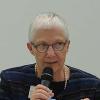
A child carries a bucket along a row of destroyed buildings March 16 in Gaza City. (OSV News/Courtesy of Caritas Poland)
Israel's punishing war on Gaza in retaliation for the gruesome attack led by Hamas on Oct.7, 2023, has shocked the world, created an all-encompassing humanitarian crisis, and intensified fear and division in many communities. People of conscience, including thousands of students around the world, are demanding an end to the violence. But, when there is a cease-fire and a return of the hostages, who will enforce it? Many of us believe in the immorality of adding more weapons to a highly militarized region and are pleading for a turn to nonviolence.
One important possibility would be to send to Gaza and the West Bank a large-scale, experienced, well-trained international force of unarmed civilian protectors, or UCP, who have proven that they can deter violence, accompany hostages, protect the delivery of humanitarian assistance, protect homes, and assist the implementation of cease-fires. Such an endeavor is being planned by an organizing group of experienced UCP practitioners, including Palestinians. As a Catholic organization committed to Gospel nonviolence, Pax Christi International's Catholic Nonviolence Initiative is participating in this ambitious effort as an excellent example of carefully planned, potentially very effective nonviolent action in our world worn out by violence.
These civilian protectors will not be seconded, unarmed military and police units similar to the former Temporary International Presence in Hebron, or TIPH. Unarmed civilian protection is fundamentally different from armed peacekeeping. And they will have to have a robust mandate that includes direct protection — not just monitoring and reporting as TIPH had following the Oslo Accords.
In her March assessment of the crisis in Gaza and on the West Bank, Francesca Albanese, the U.N. Human Rights Council's special rapporteur on the situation of human rights in the Palestinian territories called for the temporary deployment, in consultation with the state of Palestine, of "an international protective presence to constrain the violence routinely used against Palestinians in the occupied Palestinian territory."
Advertisement
Even though they have faced intensified harassment and violence from settlers and the Israeli Defense Forces, or IDF, since Oct. 7, groups including Ta'ayush, Looking the Occupation in the Eye, the Center for Jewish Nonviolence, and Community Peacemaker Teams have been providing a protective presence and supporting self-protection in the homes of Palestinians and at checkpoints, and accompanying farmers and shepherds.
Always nonviolent and focusing on the primacy of local actors, at least 61 nongovernmental organizations now practice unarmed civilian protection in 30 areas of the world. At least 20 of these groups have had experience in Israel and the occupied Palestinian territories.
Mounting research, now being collected at the Creating Safer Space UCP Research Database, demonstrates the effectiveness of unarmed civilian protection at saving lives, creating safer spaces, changing conflict trajectories, and reducing levels of violence. Since the recommendations of the High-Level Independent Panel on Peace Operations for unarmed approaches, UCP has been recommended in numerous U.N. Security Council and General Assembly resolutions, reviews and reports. The U.N. Department of Peace Operations has recently been sponsoring UCP training. Nine U.N. agencies, the European Union and the governments of 11 countries have given funding to NGOs providing unarmed civilian protection. The Organization of Islamic Cooperation co-organized a policy forum on UCP at the International Peace Institute.
Following the targeted killing of the World Central Kitchen staff by IDF drones on April 1 and the killing of civilians by Hamas on Oct. 7, it is fair to ask why unarmed civilian protectors would be treated any differently, but the international attention brought on by these tragedies may actually expand the protection internationals can provide. At least there is sufficient evidence to try nonviolent approaches to the protection of vulnerable communities that are reeling from violence in the Holy Land.






